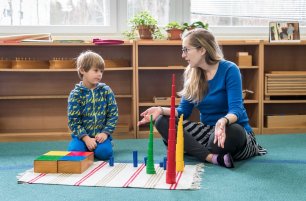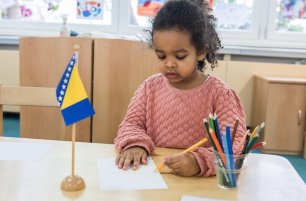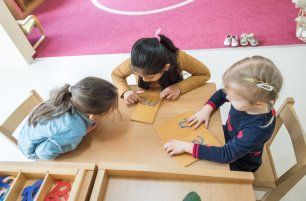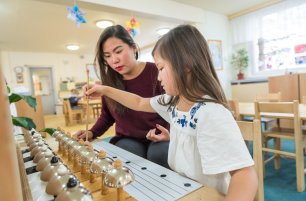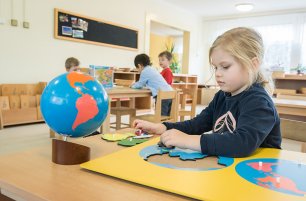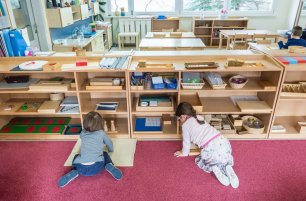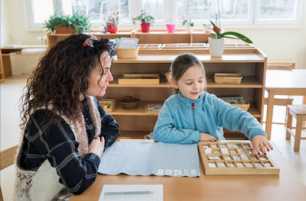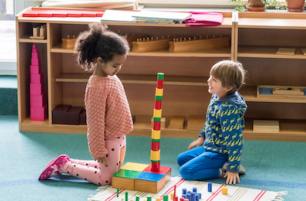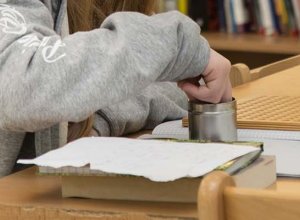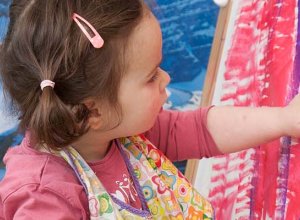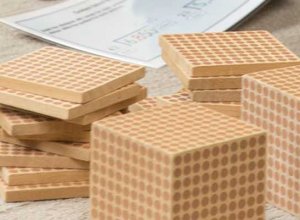Primary
The Primary years, ages three to six, are a developmental period when children are particularly sensitive to taking in information. Dr. Maria Montessori observed that children in this stage of life appear to "absorb" information nearly effortlessly from the environment surrounding them. To take advantage of this naturally occurring propensity for comprehension through doing, touching and experiencing, Montessori Primary classrooms are very carefully prepared to offer concrete, hands-on, self-directed and self-correcting materials. The students use these Montessori materials to understand more abstract concepts which in more traditional environments they might have been asked to simply memorize or accept. The specially trained teachers offer guidance and lessons, ensuring exposure to a broad range of activities while allowing each child to follow her own interests and pace. In this way, the Primary student lays a solid foundation upon which virtually all of her later learning will be built.

Ideally, a child enters one of our Primary classrooms as a three year old and remains in that same environment for three consecutive years, growing and learning at his own pace. Children are free to explore and also receive lessons for each material. With a mixture of ages in the class, children experience the freedom of learning at their own pace, rather than one that has been pre-determined as appropriate for their chronological age. Leadership skills develop naturally. Our Primary program provides an enriching hands-on learning experience with specially formulated Montessori materials for math, language, sensorial exploration, practical life activities, art, science, and geography. A few times a week, the children participate in the Czech Primary Program, still learning through the Montessori Method but in a Czech language environment. The students build their Czech vocabulary and develop individual abilities and skills, achieving their highest potential in all areas.
By the time a child has completed a three-year Montessori Primary cycle (encompassing the traditional pre-school and kindergarten ages) he will likely be reading, doing addition and subtraction in the abstract, be comfortable working independently as well as acting as leader and being part of a group, and be focused enough to concentrate on and complete a complex series of tasks happily.
Making choices and using coordinated movements to accomplish tasks leads the child toward self-regulation and self-control. Children develop observation and problem-solving skills. By manipulating, experimenting, and discovering, children begin to move from the concrete to the abstract as they prepare for the more complex studies of the IMSP elementary program.
Who is the 3-6 year old?
During the three- to six-year-old period, children make great developmental strides and show an enormous interest in the world around them. They are eager to learn, explore, and exert their ever-growing independence. The children learn through their interactions with their environment, by exploring, experimenting, touching, building, and doing things by and for themselves.

While many preschool children at this developmental stage still prefer parallel play, they are all beginning to learn to socialize, understand feelings, and manage working and playing in a group. They are fascinated by language and the names of things and are communicating well—adding new words by the thousands.
Dr. Montessori referred to this stage as the period of the Absorbent Mind. She observed that children under the age of six absorb information without effort, through their everyday interactions with those around them and their environment. This important time of development provides the critical foundation of a child’s character, learning, and growth. As in all stages of child development, Dr. Montessori noted certain sensitive periods during this stage, a time when a child is powerfully motivated, driven, and able to learn certain things. These sensitive periods include aspects of movement, reading, mathematics, order, music, grace and courtesy, and many others. The classroom environment is designed to give the children a place in which they can work and learn freely, following their interests and natural tendencies. Our IMSP Primary classrooms are beautiful environments uniquely prepared to welcome and engage young children. Children work independently, in small groups with teachers, and with younger and older peers. Our experienced teachers fill the Montessori environment with opportunities for learning, exploration and socialization.
